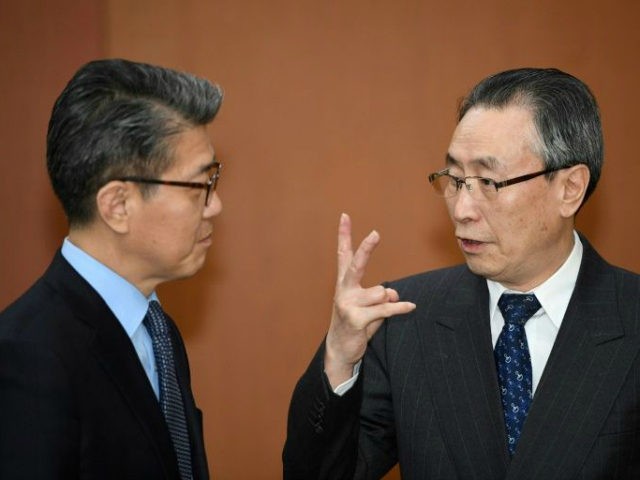China sent its top nuclear envoy, Wu Dawei, special representative for Korean Peninsula Affairs, to South Korea on Monday to discuss reaction to an increasingly belligerent North Korea, days after President Xi Jinping arrived from an in-person summit with President Donald Trump in Florida.
Wu reportedly met with Kim Hong-kyun, who holds a parallel Chinese relations position in South Korea, and is scheduled to meet presidential candidates running for the chance to succeed Park Geun-hye, whom South Korean lawmakers removed from the presidency through impeachment this year. Should Park’s successor come from the nation’s political left, the country’s current hard-line approach towards North Korean belligerence may yield to a faction more open to diplomacy and opposed to an American role in the dispute.
Wu will spend four days in South Korea.
The South Korean newswire service Yonhap quoted Kim, the first to meet with Wu, as saying that the two diplomats “reached a shared understanding that sanctions and pressure, including thorough implementation of U.N. Security Council resolutions, should be steadily intensified in the face of North Korea’s continued provocations.”
“We shared the view that strong, additional measures should be taken if North Korea pushes ahead with strategic provocations like a nuclear test or an ICBM launch in defiance of international warnings,” Kim added.
The Chinese government responded through its Foreign Ministry daily briefing. On Monday, spokeswoman Hua Chunying said that Chinese officials felt “all relevant parties should exercise restraint and avoid activities that may escalate the tension.”
She added that Beijing and Washington had agreed to cooperate to prevent Pyongyang from acquiring nuclear weapons. Xi and Trump “confirmed their commitment to the denuclearization of the Korean Peninsula, reiterated that they would continue to fully implement relevant UN Security Council resolutions, and agreed to maintain close communication and coordination on the issue,” she said.
Chinese officials forced North Korean cargo ships, bringing coal to trade with Beijing, to return home this week, a sign that China is committed to keeping with United Nations economic sanctions on North Korea. China announced in February that it would not buy any more coal from North Korea for the rest of the year in response to the assassination of Kim Jong-nam, brother of dictator Kim Jong-un, in Malaysia. North Korea responded with a rare scathing editorial in state media dismissing China as a “U.S. vassal force.” Pyongyang also denies having killed Kim with VX nerve agent, a weapon of mass destruction, though Malaysian authorities have traced the killers back to North Korea.
China is North Korea’s largest trade partner and wields significant power over North Korea’s national economy. A Chinese boycott could rapidly collapse said economy.
President Donald Trump has repeatedly emphasized that China has an outsized role to play in containing North Korea. “North Korea is looking for trouble. If China decides to help, that would be great. If not, we will solve the problem without them! U.S.A.,” Trump wrote on Twitter Tuesday. “I explained to the President of China that a trade deal with the U.S. will be far better for them if they solve the North Korean problem!”
Washington has also reportedly moved a U.S. Navy strike group closer to the Korean peninsula to prepare for any provocations by Pyongyang.
“We will hold the US wholly accountable for the catastrophic consequences to be entailed by its outrageous actions,” the state-run Korean Central News Agency (KCNA) warned, quoting a high-ranking North Korean official, following the reports of U.S. Navy activity.
“The reality goes to clearly prove that the U.S. remains unchanged in its wild ambition for maintaining its colonial rule over south Korea and gets ever more sly and vicious in its methods to quench the south Korean people’s growing desire for independence,” the Rodong Sinmun, North Korea’s state newspaper, denounced on Tuesday.

COMMENTS
Please let us know if you're having issues with commenting.